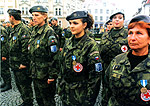Women in the Armed Services
Wikis > Women in the Armed Services
Women are represented in the armed forces of many countries, but they are excluded from most combat jobs. There is  ongoing debate on whether this is a case of sexual discrimination or a recognition of the biological and physical differences between men and women. So while women have played key roles in support services to the armed forces throughout history and today, there remains questions on whether: a) quotas should be imposed to increase the number of women in the armed forces (in non-combat roles); and b) whether restrictions limiting women’s promotion and the type of position should be lifted.
ongoing debate on whether this is a case of sexual discrimination or a recognition of the biological and physical differences between men and women. So while women have played key roles in support services to the armed forces throughout history and today, there remains questions on whether: a) quotas should be imposed to increase the number of women in the armed forces (in non-combat roles); and b) whether restrictions limiting women’s promotion and the type of position should be lifted.
 ongoing debate on whether this is a case of sexual discrimination or a recognition of the biological and physical differences between men and women. So while women have played key roles in support services to the armed forces throughout history and today, there remains questions on whether: a) quotas should be imposed to increase the number of women in the armed forces (in non-combat roles); and b) whether restrictions limiting women’s promotion and the type of position should be lifted.
ongoing debate on whether this is a case of sexual discrimination or a recognition of the biological and physical differences between men and women. So while women have played key roles in support services to the armed forces throughout history and today, there remains questions on whether: a) quotas should be imposed to increase the number of women in the armed forces (in non-combat roles); and b) whether restrictions limiting women’s promotion and the type of position should be lifted.
Global survey
North Atlantic Treaty Organization (NATO): The welfare of female soldiers in NATO is overseen by the Committee on Women in the NATO Forces’ (CWINF) mission which advises NATO leadership and member nations on issues affecting women in the Alliance’s Armed Forces. Women represent from 0.5-17% of soldiers in each NATO country’s armed forces.
- Australia: Women make up 12.8% of the Australian Defence Force (with 15.1% in the Royal Australian Air Force, 14.6% in the Royal Australian Navy and 10.5% in the Australian Army) and 17.5% of the reserves. However, only 74% of the total number of available roles in the Australian armed forces are available to women. Despite this, using 1998-99 figures, the ADF had the highest percentage of women in its employ in the world.
- United Kingdom: Female personnel currently make up around 9% of the British armed forces. The seizure of Royal Navy sailor Faye Turney in 2007 by the naval forces of the Iranian Revolutionary Guard led to some media comment on the role of women and mothers in the armed forces. The commander-in-chief of the British Armed Forces is a woman (Queen Elizabeth II) though her position is only nominal.
- Canada: In 1970 the government created a set of rules for the armed forces designed to encourage equal opportunities. These included the standardization of enlistment criteria, equal pay and pensions, and allowing women to enroll in all aspects of the Canadian armed forces and making it possible for women to reach any rank.
- Germany: Germany was forced to change its restrictions of women in combat roles the armed forces in 2000, after a ruling by the European Court of Justice. In 2001, the first 244 volunteers were admitted to train for combat roles.
- The United States of America: Women enlisted soldiers are barred from serving in Infantry, Special Operations, Artillery, Armour, and Forward Air Defense, however female officers can hold staff positions in every branch of the Army except infantry and armor. Women now comprise more than 12% of the armed forces.
References
- http://en.wikipedia.org/wiki/Women_in_the_military
- http://www.fas.org/man/crs/92-008.htm
- http://www.nato.int/issues/women_nato/index.html


